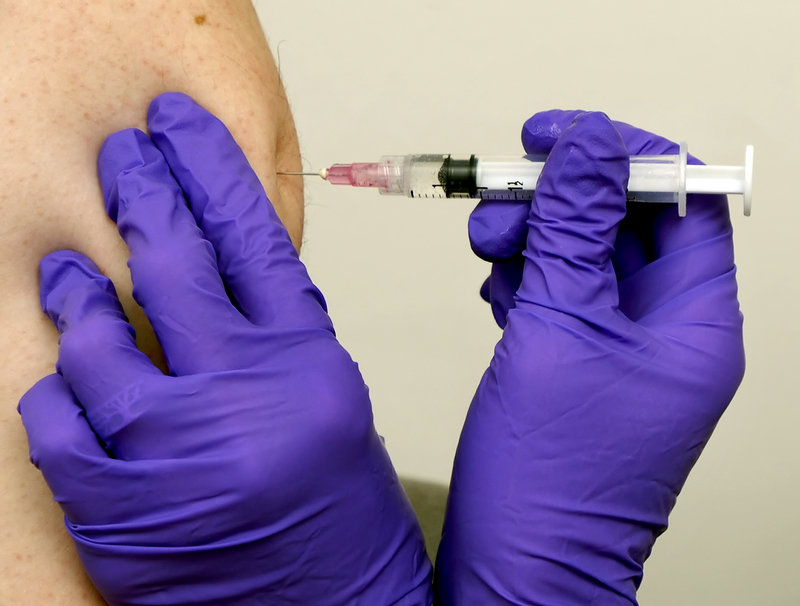Flu season hasn’t yet hit Maine, but “flu fatigue” may have.
Health experts say fewer Mainers appear to be getting vaccinations this year than in past years. They think it may be partly because there was so much fear and hype last year.
“Flu will come, and we are trying to get the message out that everyone over the age of 6 months is a candidate for getting the flu shots. We have lots of vaccine,” said Dr. Stephen Sears, Maine’s state epidemiologist.
Maine has had one confirmed case of seasonal flu. The illness occurred in the midcoast last month and did not lead to any serious health complications. That’s fairly typical, experts said, because the flu usually reaches Maine in January or February, or later.
The odds of a flu outbreak here will start rising this week, as college students come home from other parts of the country and families leave the state to see relatives, sometimes bringing home the virus.
“We probably will have importation of influenza by travelers,” Sears said.
There are pockets of flu in several regions of the country, especially the Southeast. Cases are scattered in the Northeast. A 4-year-old boy in New Rochelle, N.Y., died this month from flu complications.
While the flu season is typically slow to start in Maine, last year it had already peaked by this time.
“Last year was clearly not routine. We had a new strain (H1N1), a pandemic, and it came early,” Sears said.
The H1N1 pandemic caused widespread fear and long waiting lines for vaccinations. And it did lead to serious illnesses. By this time last year, 13 Mainers had died after contracting the flu. All of them had underlying medical conditions.
As serious as it was, the H1N1 pandemic did not spread through Maine the way some health officials warned it might.
But, in part because H1N1 is still an active virus in the United States, the U.S. Centers for Disease Control and Prevention recommends this year that all people older than 6 months get vaccinated.
Last year’s hype, together with the slower start this year, may have caused what some experts call flu fatigue or hangover.
“There was a lot of hype, and people came out in droves” for vaccinations last year, said Cathy Patnaude, community health program supervisor for HomeHealth Visiting Nurses in Saco. “After you have a pandemic or a vaccine shortage, the next year the perception is that nothing really happened. We usually have that hangover effect.”
“I’ve heard people say, ‘Well, I decided not to do it this year,’ ” said Caroline Teschke, manager of infectious disease programs at Portland’s India Street Clinic. “Last year’s experience may have reinforced that for some people. There was a pandemic and they still didn’t get the flu.”
It’s not unusual for people to start getting shots only when they have heard about flu cases in their communities or workplaces.
“The problem then is that some of them have already got the flu and are incubating it when they come in and get the shot,” Teschke said. “And then they’ll say, ‘Well, I never got the flu until I got the flu shot.’“
India Street Clinic, which provides shots for $10, has given out far fewer flu shots than in past years.
Even compared with 2008-09, a relatively normal year, vaccinations are down 38 percent so far this year, Teschke said.
Not all of the decrease is due to flu fatigue. An unknown number of patients who might have come to the clinic got their shots instead at the large pharmacy chains, which began providing shots this fall for the first time, for about $30 each.
The state doesn’t track the number of people who get vaccinated, so there is no overall data to compare with past years. However, a recent federal survey that included Cumberland County residents indicated that vaccination numbers are down overall, Sears said.
Any decrease in vaccination rates increases the risk of the flu spreading more easily, Sears said. “The more of us that get vaccinated, the better it is for all of us,” he said.
Teschke said the city’s clinic has so much vaccine left that she might hold an off-site clinic in January.
“It’s such a simple thing you can do for your health,” she said.
“Thirty thousand to 40,000 people die from (flu) every year, and people forget that.”
Staff Writer John Richardson can be contacted at 791-6324 or at: jrichardson@pressherald.com
Send questions/comments to the editors.



Success. Please wait for the page to reload. If the page does not reload within 5 seconds, please refresh the page.
Enter your email and password to access comments.
Hi, to comment on stories you must . This profile is in addition to your subscription and website login.
Already have a commenting profile? .
Invalid username/password.
Please check your email to confirm and complete your registration.
Only subscribers are eligible to post comments. Please subscribe or login first for digital access. Here’s why.
Use the form below to reset your password. When you've submitted your account email, we will send an email with a reset code.